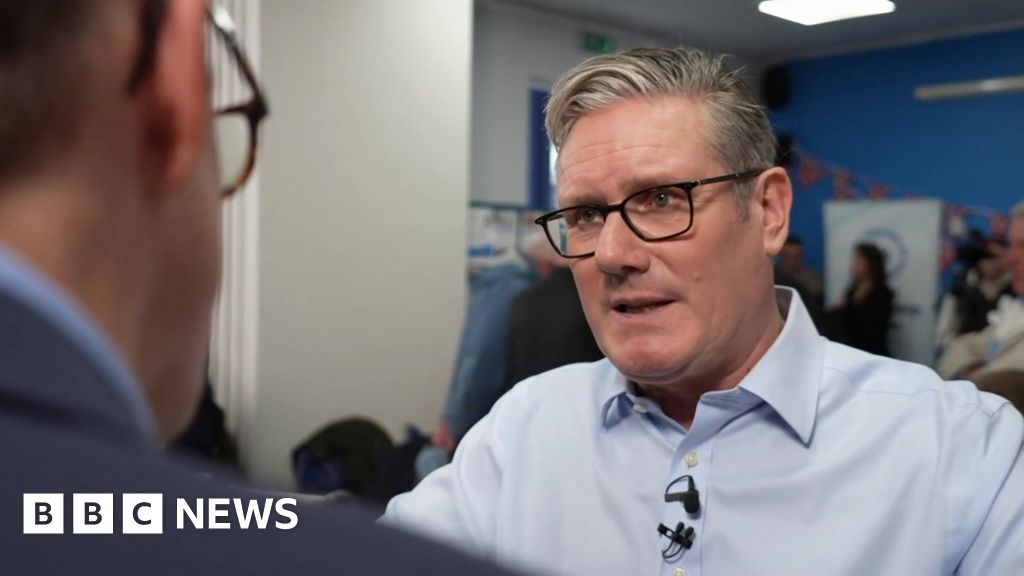Chris Mason: Starmer could have scrapped child benefit cap last year – why did he wait?

I can’t remember when I last heard Sir Keir Starmer sounding so passionate.
The prime minister’s critics regularly lambast him for what they see as robotic or emotion-free communication, but you could not accuse him of that as we spoke on a post-Budget visit to a community centre in Rugby, Warwickshire.
I could see it in his eyes and hear it in his tone.
“I have repeatedly said that I want my government to drive down child poverty. That is a political mission. It is a personal mission,” the PM told me.
He was talking about the policy announced in the Budget to scrap the two child benefit cap, introduced under the Conservatives in 2017, meaning parents can only claim universal credit or tax credits for their first two children.
It will end next April.
“I don’t want hundreds of thousands of children in this country living in poverty. I think it’s abhorrent,” he said.
“And I’m really proud that yesterday was the day that this government lifted half a million children out of poverty. It’s a very good thing for those children.”
And yet it has taken him almost 18 months in office to make this announcement and in that year and a half he kicked seven Labour MPs out of his parliamentary party for voting for the very thing he is now so passionately endorsing.
The PM’s argument has always been one of affordability.
He would regularly tell me before the general election that removing the cap was something he really wanted to do but he claimed there wasn’t enough money for.
That remained his judgement and the Chancellor’s, when she unveiled her first Budget a little over a year ago.
Now, they argue, there is enough money.
This is a reminder of a fundamental truth when the details of any Budget are being pored over: it is an exercise in choices.
Affordability for a government is rarely an absolute, it is a judgement about what is a priority at any given moment and therefore what isn’t.
The striking big picture observation about Wednesday’s Budget is the extent to which Sir Keir and Chancellor Rachel Reeves are proudly leaning into it being about big tax increases and big spending increases.
The usual criticism made by opponents of Labour governments – that they tax and spend – is something Starmer and Reeves are seeking to make a virtue of.
It is a Leftwards tilt – and some distance from what senior Labour figures repeatedly told during the general election campaign when I challenged them about the prospect of tax increases.
Back then, the reply was always that they had “no plans” to do that.
Government figures argue these are tax rises are different because they have a morally just purpose. Some will agree with that, others won’t.
But it is unquestionably politically different from where they were.
Was it evidence, I suggested to the prime minister, that his mantra of “country first, party second” had now been reversed?
Was the Budget about a politically vulnerable prime minister and chancellor shoring up support among their own MPs, who fret that the government – and by extension them – are deeply, deeply unpopular?
There is no doubt that was part of their – perfectly rational – political calculation.
“It’ll go down well with the PLP,” one minister told me, referring to the Parliamentary Labour Party, knowingly nodding to the prospect that a wider audience around the country may be more sceptical.
The prime minister insisted to me it was the first principles that motivated him – driving down child poverty, improving the NHS and schools.
But both things can be true at the same time.
“We’ve got to show that we get it,” one senior adviser tells me.
They characterise the government’s current posture as doubling down on focusing on the cost of living.
“Living standards are squeezed and have been for ages and ages. Nearly 20 years. This is the politics of trying. And showing that we are trying – via various levers – to make a difference,” a cabinet minister tells me.
Hence the focus in the Budget on energy bills, rail fares and the costs of a prescription, for instance.
Labour MPs, for now, seem willing to at least give the prime minister and the chancellor the benefit of the doubt.
Others are much more positive, glad to have something they believe in they can sell on the doorstep.
The prime minister wants to sound upbeat without sounding detached.
“I’m optimistic about this country. I think by putting in the proper foundations, taking the fair and necessary decisions, we can defy all of the forecasts,” he tells me.
He knows defying the gloomy economic forecasts will be key to him defying the gloomy political forecasts, with many of his own MPs privately pondering how long he should carry on if the government continues to remain so unpopular with voters.
An improvement in the government’s popularity, and therefore their own popularity, is what they really crave.
Published at Thu, 27 Nov 2025 16:05:47 +0000